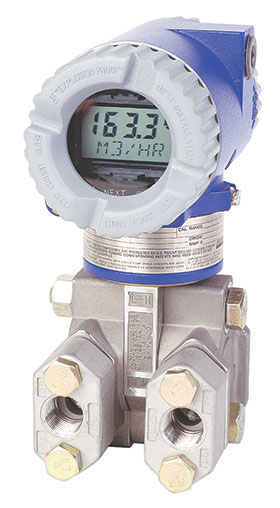

The traditional approach has been to use a conventional differential pressure (DP) transmitter with external water-filled ‘wet’ legs connecting both the high and low pressure sides of the transmitter to the drum. A pressure transmitter is also used to measure the steam pressure in the drum. The use of DP transmitters for drum level is ideal because of their low cost, ease of installation and high reliability. However, the output of a conventional DP transmitter in this application will have inaccuracies caused by changes in static pressure, the densities of the water in each leg, and the densities of the steam and water in the drum. Although water is normally thought of as an incompressible fluid, high pressure causes density changes independent of those created by temperature variations.
Foxboro’s solution
The Foxboro IMV31 density-compensated level transmitter provides a new approach to drum level measurement. While maintaining all the advantages of DP transmitters, it uses multiple measurements and onboard level calculations to provide a more accurate measurement. This eliminates the need to make similar level calculations in the control system. The IMV31 is based on Foxboro’s proven multivariable transmitter technology, which was originally developed for flow measurement.
The heart of the IMV31 is its ability to conduct onboard level calculations based on multiple measurements and fluid density calculations. The IMV31 transmitter has a pressure sensor and a differential pressure sensor, as well as two internal temperature sensors. It also has the ability to power and monitor an external RTD temperature sensor.
The instrument calculates four unique fluid densities, based on measured pressures and temperatures and uses this information along with the DP measurement to calculate an accurate density-compensated drum level. The densities of the water and steam are separately calculated, based on the pressure measurement and drum temperature. Although there is an RTD input, the transmitter can be configured to use the saturation temperature corresponding to the measured drum pressure in the calculation of water and steam densities. The densities of the water in each external wet leg are similarly calculated based on the measured pressure and temperatures.
Because the transmitter measures pressure and differential pressure, it has the unique ability to self-compensate for static pressure effects on the DP measurement, a feature not available on conventional DP transmitters.
IMV31 results
Regardless of the size of the drum and the saturation pressure, the IMV31 significantly improves the accuracy of drum level measurement over conventional DP transmitters and automatically provides dynamic compensation for varying pressures and temperatures.
The following two examples show the diversity and results that can be achieved:
Application 1
A 20 bar boiler with an 800 mm drum (-400 to +400) where level is measured from the midpoint of the range (0 mm) down to -400 mm or up to +400 mm. Using a conventional DP transmitter without density compensation, the following errors can be expected during critical start-up conditions when the drum pressure is at 3,5 bar:
• At -400 mm, the indicated level would be 6 mm high (0,84% of span).
• At 0 mm, the indicated level would be 30 mm low (3,7% of span).
• At +400 mm, the indicated level would be 30 mm low (8,2% of span).
The density-compensated IMV31 can reduce these errors to ±0,3% of span or less than ±2,5 mm
Application 2
A 70 bar boiler with a 1500 mm drum (-750 to +750) where level is measured from the midpoint of the range (0 mm) down to -750 mm or up to +750 mm. Using a conventional DP transmitter without density compensation, the following errors can be expected during critical start-up conditions when the drum pressure is at 6,9 bar:
• At -750 mm, the indicated level would be 50 mm high (3,3% of span).
• At 0 mm, the indicated level would be 110 mm low (7,3% of span).
• At +750 mm, the indicated level would be 275 mm low (17,9% of span).
The density-compensated IMV31 can reduce these errors to ±0,3% of span or less than ±5 mm.
The benefits include:
• Accurate level measurement of ±0,3% of maximum level.
• Increased reliability due to fewer transmitters and related equipment.
• Reduced cost of equipment, installation, and wiring.
• Improved process integrity from fewer field devices and connections.
Business value
Regardless of the size of the drum and the saturation pressure, the IMV31 multivariable transmitter significantly improves the accuracy of drum level measurement over conventional DP transmitters and automatically provides dynamic compensation for varying pressures and temperatures.
For more information contact Paulo de Sousa Gomes, EOH, +27 (0)87 803 9779, paulo.desousagomes@eoh-pas.co.za, www.eoh-pas.co.za
| Tel: | +27 11 607 8100 |
| Email: | contact@di-pas.co.za |
| www: | www.di-pas.co.za |
| Articles: | More information and articles about Digitial Industries - Process Automation Solutions |
© Technews Publishing (Pty) Ltd | All Rights Reserved